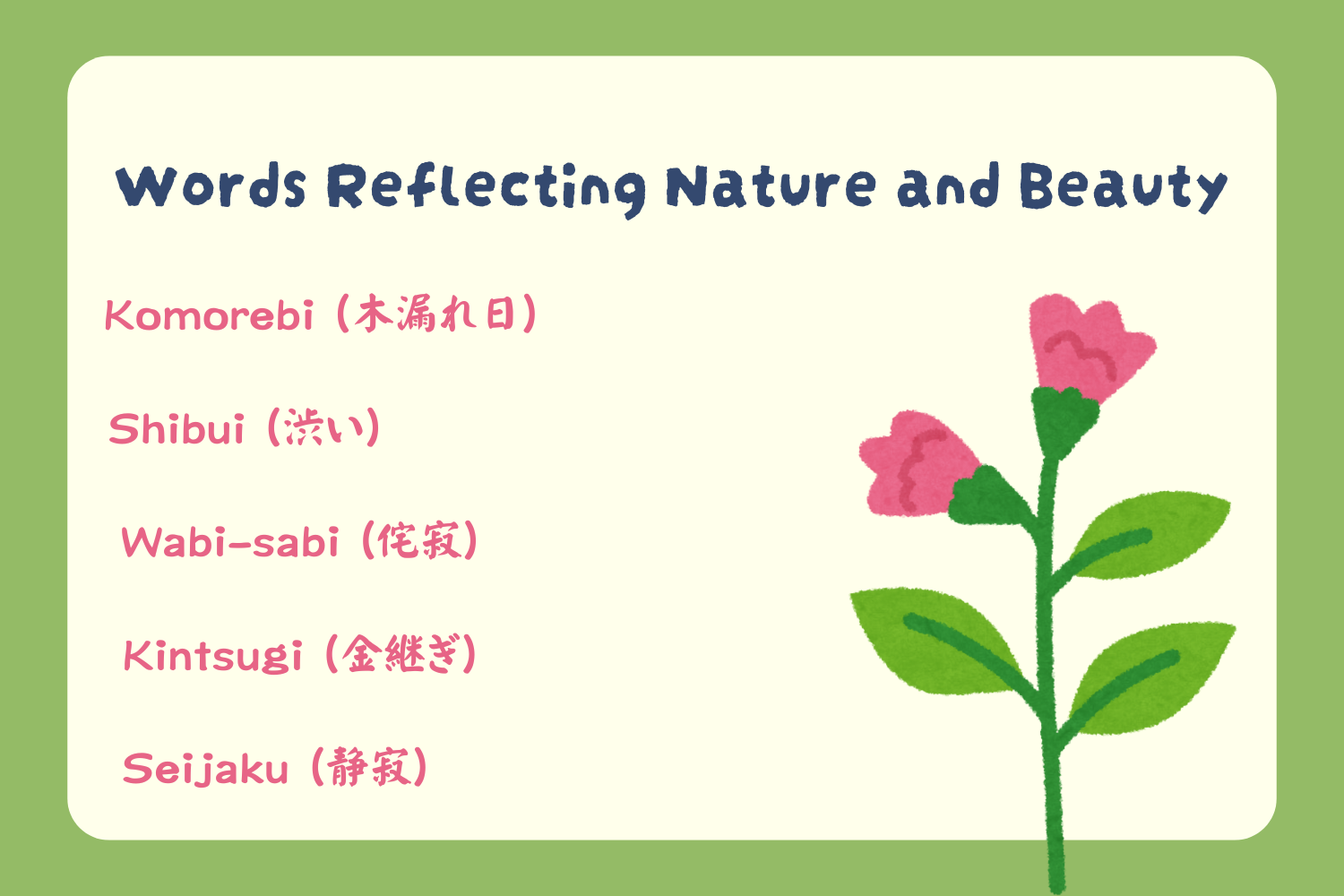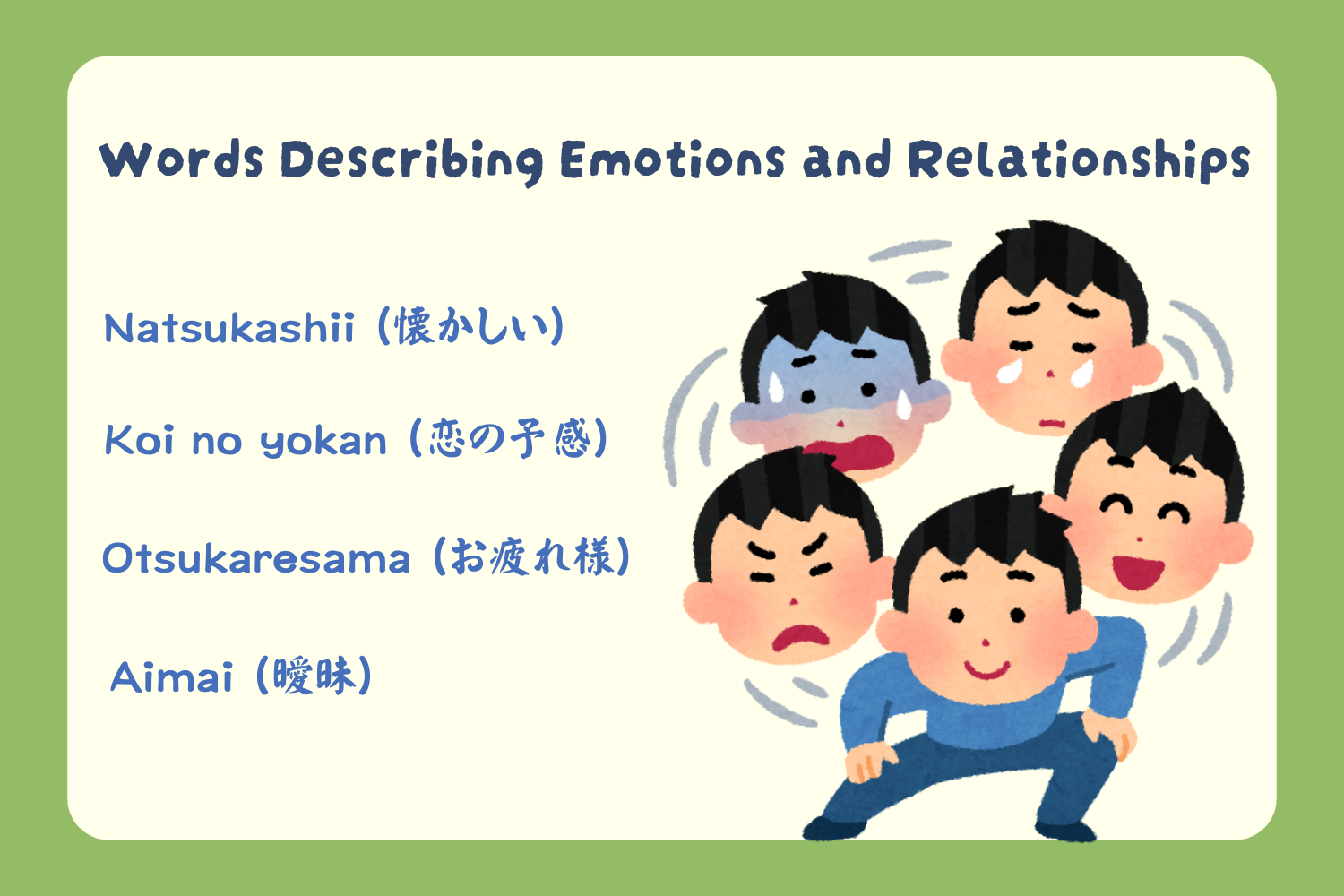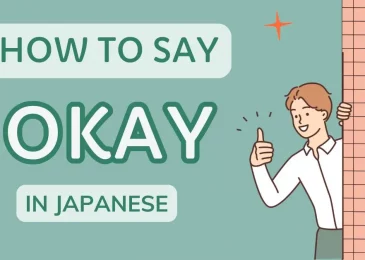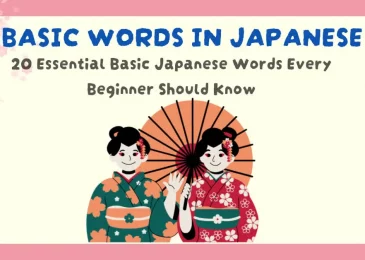Japanese is a language rich in words that capture complex ideas, emotions, and values in just a few characters. These Japanese words with deep meaning reveal a distinct worldview focused on beauty, mindfulness, and harmony with both nature and society. From words that express appreciation for simplicity to those that reflect philosophical ideals, these terms offer unique insights into Japanese culture.
In this article, we’ll explore 20 Japanese words with profound meanings. These terms are organized into thematic groups, each shedding light on different aspects of Japanese life, from nature and beauty to philosophy, relationships, and etiquette. Whether you’re a language enthusiast or simply curious about Japanese culture, these words offer a new perspective on life and connection.
Words Reflecting Nature and Beauty – Japanese word with deep meaning
In Japan, nature and its cycles are deeply respected and appreciated. These words reflect a profound connection to the natural world and a preference for simplicity.
Komorebi (木漏れ日)
Komorebi refers to the sight of sunlight filtering through tree leaves, creating beautiful patterns of light and shadow. This simple yet captivating moment reflects a reverence for fleeting beauty and a sense of peace that can be found in nature. Komorebi reminds us to pause and enjoy the small, quiet moments that surround us every day.
Wabi-sabi (侘寂)
Rooted in Zen philosophy, wabi-sabi embraces imperfection and transience. It is an aesthetic that values rustic simplicity and finds beauty in flaws, such as the irregular shape of handmade pottery or the natural aging of wood. Wabi-sabi teaches acceptance of life’s natural cycles of growth and decay, celebrating authenticity over perfection.
Shibui (渋い)
Shibui describes an understated, subtle beauty that becomes more appealing with time. This concept is often applied to objects that have an aged elegance, like a well-worn wooden table or earthy colors in art. Shibui represents mature beauty and reminds us that true depth is found beneath the surface.
Kintsugi (金継ぎ)
Kintsugi is the art of repairing broken pottery with lacquer mixed with gold, silver, or platinum. Rather than hiding the cracks, kintsugi highlights them, symbolizing resilience and the beauty of embracing imperfections. This practice reminds us that our flaws and struggles can become our unique strengths.
Seijaku (静寂)
Seijaku is the serene silence often found in nature or during meditation. This tranquility, or “silent stillness,” allows one to find inner calm and focus. Seijaku is a central element in Zen practices, promoting mindfulness and connection with one’s surroundings.
Words Describing Emotions and Relationships
The following words reflect emotions, relationships, and social norms in Japan. Each term captures a unique feeling or connection, emphasizing the importance of subtlety and respect.
Natsukashii (懐かしい)
Natsukashii is a nostalgic longing or warm reminiscence of the past. This feeling arises when something reminds us of good memories, evoking a gentle longing for a moment that’s now gone. Unlike bittersweet nostalgia, natsukashii is comforting and celebrates cherished memories.
Koi no yokan (恋の予感)
Koi no yokan describes the premonition of love—the feeling of knowing you’re destined to fall in love with someone upon first meeting them. Unlike “love at first sight,” it’s a subtle awareness of love that will bloom in the future. This term reflects the charm of potential romance.
Otsukaresama (お疲れ様)
Commonly used in workplaces and gatherings, Otsukaresama recognizes someone’s hard work and effort, usually at the end of the day. Saying Otsukaresama shows appreciation and respect, strengthening bonds and fostering a sense of camaraderie in work or social settings.
Aimai (曖昧)
Aimai represents ambiguity or vagueness, often used to avoid directness. In Japanese culture, indirect communication is valued, as it maintains harmony and prevents confrontation. Aimai allows room for interpretation, respecting the listener’s thoughts and feelings.
Enryo (遠慮)
Enryo refers to the concept of modesty and restraint, particularly in social interactions. It encourages individuals to avoid imposing on others, showing humility and respect. Enryo is a reflection of Japanese society’s value for harmony, politeness, and subtlety.
Words Reflecting Philosophy and Life Perspective
Japanese culture holds philosophical concepts that guide life, relationships, and one’s approach to challenges. These words reveal a deep connection to values like mindfulness, resilience, and purpose.
Ikigai (生き甲斐)
Ikigai combines iki (life) and gai (worth) to represent one’s “reason for being.” It’s the joy or fulfillment that drives us each day, whether it’s work, hobbies, or relationships. Discovering ikigai is believed to bring a sense of purpose and satisfaction, enhancing one’s well-being.
Mono no aware (物の哀れ)
Mono no aware is the awareness of impermanence and the beauty in things that are fleeting. This concept encourages a mindful appreciation of moments that will pass, reminding us to cherish life’s transient nature and find beauty in what’s temporary.
Satori (悟り)
Satori is a sudden moment of enlightenment or spiritual awakening. In Zen Buddhism, satori brings clarity and understanding of life’s true nature. This profound realization offers a sense of peace and acceptance, often achieved through meditation or introspection.
Gaman (我慢)
Gaman embodies patience, perseverance, and self-control during hardship. This concept reflects a cultural emphasis on resilience and inner strength, encouraging individuals to face difficulties with dignity and calm.
Wa (和)
Wa means harmony, balance, and peace, a guiding principle in Japanese relationships and society. It promotes social unity, cooperation, and respect for others. The concept of wa reinforces the importance of maintaining peaceful and balanced interactions in both personal and communal life.
Words Related to Hospitality and Social Etiquette
These words reflect the Japanese values of politeness, respect, and creating a welcoming environment, especially in social situations.
Omotenashi (おもてなし)
Omotenashi is the spirit of selfless hospitality, where hosts anticipate the needs of their guests without expecting anything in return. It’s evident in Japanese service culture, from hotels to restaurants, and emphasizes genuine care and thoughtfulness.
Hikikomori (引きこもり)
Hikikomori describes the phenomenon of social withdrawal, often where individuals isolate themselves from society for long periods. This term highlights the pressures of Japanese society, especially for youth, and the challenges faced by those who struggle to fit in with societal expectations.
Tsundoku (積ん読)
Tsundoku humorously describes the act of buying books and never reading them, leading to a pile of unread material. It’s a familiar experience for book lovers, symbolizing both the love for knowledge and the aspiration to learn.
Yugen (幽玄)
Yugen is a profound sense of mystery and beauty that is elusive and cannot be fully explained. Often used in Japanese art, it encourages one to embrace subtlety and leaves space for interpretation, reflecting the cultural appreciation for depth and nuance.
Shinrin-yoku (森林浴)
Shinrin-yoku, or “forest bathing,” refers to spending time in nature, particularly forests, to rejuvenate. This practice promotes mental relaxation and is a way to reconnect with the natural world, highlighting Japan’s deep respect for nature’s healing power.
Conclusion
Each of these Japanese words with deep meaning reveals an aspect of Japanese culture, from a love for nature and tranquility to a preference for subtlety in communication and respect for social harmony. These words teach us to embrace simplicity, find purpose, and cherish life’s transient moments.
Incorporating these concepts into our own lives can offer a fresh perspective, encouraging us to appreciate small moments, practice patience, and approach life with mindfulness and respect. Japanese culture’s emphasis on harmony, beauty in imperfection, and a balanced lifestyle provides valuable lessons that resonate beyond language and cultural boundaries.
For language learners, understanding these terms not only deepens knowledge of Japanese vocabulary but also offers a unique insight into Japan’s philosophy and values. Through these words, we gain a greater appreciation for Japan’s worldview and the wisdom embedded within its language.







